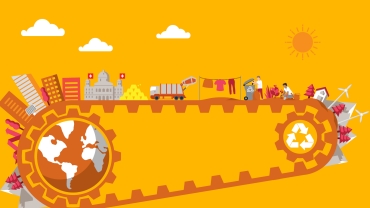
With COVID-19 having been the focus of attention for over a year, decision-makers are now directing more consideration to other issues again, particularly climate change. To move current efforts forward, a number of decisions have to be taken, which will lay the groundwork for developing a green economy and a sustainable Swiss financial centre and open up interesting opportunities.
World and climate in flux
2020 and 2021 can be described as years of upheaval. After the pandemic that has dominated the past year, the issues of climate protection and sustainability are once again garnering attention. Soon, further milestones will be set in order to meet commitments such as the Paris Convention, the UN’s Sustainable Development Goals (SDGs) and the EU Action Plan on Financing Sustainable Growth according to ESG criteria (environmental, social and governance). The EU, for example, agreed in late April on a new climate law. It includes ambitious targets such as cutting net carbon emissions by at least 55% by 2030, compared with 1990 levels.
Milestones in the specification of climate ambitions:
| 11 October 2021 | 1 November 2021 | 2021 - 2022 |
| UN Biodiversity Conference (CBD COP15) in Kunming from 11 to 24 October 2021 | UN Climate Change Conference of the Parties (COP26) in Glasgow from 1 to 12 November 2021 | EU Action Plan on Sustainable Finance |
Finding the right framework
The economic players must implement sustainability provisions and want to commit to climate targets. For example, they are calling for solutions that roll out a ‛level playing field’, as indicated in the Swiss edition of the 24th Annual CEO Survey. Such solutions include statutory frameworks. Therefore, it is not surprising that the economy was predominantly in favour of the revised Swiss CO2 Act.
Statutory frameworks create the same market rules for everyone and enable capital to be accessed under the same conditions. They use consistent definitions as the basis for a topic and provide a legal environment that corresponds to the international context, thereby ensuring security of planning and investment. A good example of this are the recent amendments to federal law on developments in distributed ledger technologies (DLT bill), which have opened up new market opportunities and set the sustainable use of blockchain as an innovative technology on an orderly path.
As the leading audit and advisory company in Switzerland, PwC is in contact with many economic players. We see a growing willingness to engage in committed climate policy. But the right kind of frameworks are needed for this to happen.
Combined with individual responsibility
Alongside the statutory framework, obligatory self-regulation and individual responsibility also drive the sustainable development of economy and society. Self-regulation can significantly reduce the environmental impact and pre-empt regulatory intervention by the state. This momentum is crucial for efficient interaction between legislators and business.
Self-regulation is being pushed at a number of different levels: nationally (e.g. the Swiss Associa-tion for Responsible Investments SVVK-ASIR) and internationally (e.g. the Better Gold Initia-tive), by non-profit organisations (e.g. RSPO certification by the Roundtable of Sustainable Palm Oil), by companies, by political and geopolitical authorities (e.g. the United Nations SDGs) and by individual industries (e.g. Swiss Sustainable Finance) and groups with similar interests (e.g. CEO4climate). Self-regulating initiatives often combine several of these levels.
New responsibilities, new opportunities
Such provisions not only impose obligations on the Swiss economy, but also hold a number of opportunities for fostering innovation and playing an active part in the climate discussion.
- Aiming for net zero
The majority of emissions are generated outside a company’s own operations. It is therefore important that the entire value chain is included in any net zero target: imported emissions (e.g. supply chain), the production and operations, the use phase and the end of the life cycle of products and services. Find out more about PwC’s net zero commitment. - Facilitating transparent investment decisions
The need for sustainable financial products is increasing. According to Swiss Sustainable Finance, these products are registering substantial growth. Key instruments for this are a meaningful sustainability report with standardised ESG reporting, for example according to the Stakeholder Capitalism Metrics of the World Economic Forum. - Bearing joint responsibility
The economic players are able to pool their strengths through statutory and self-regulatory commitments. With the defined CO2 reduction pathway, there are annual resources of CHF 1.5 billion remaining for additional value creation in Switzerland. This protects jobs and prosperity. - Using sustainability as a long-term transformative power
How a company deals with climate change depends on its level of ambition. To keep on top of the issue, it is necessary to transform accordingly and approach sustainability not just from a purely compliance-based perspective, but also to actively manage the corresponding risks, exploit opportunities, foster innovation and advance as a global technological visionary and supplier. To learn why you can trust in the positive power of transformation, see here.
#social#







